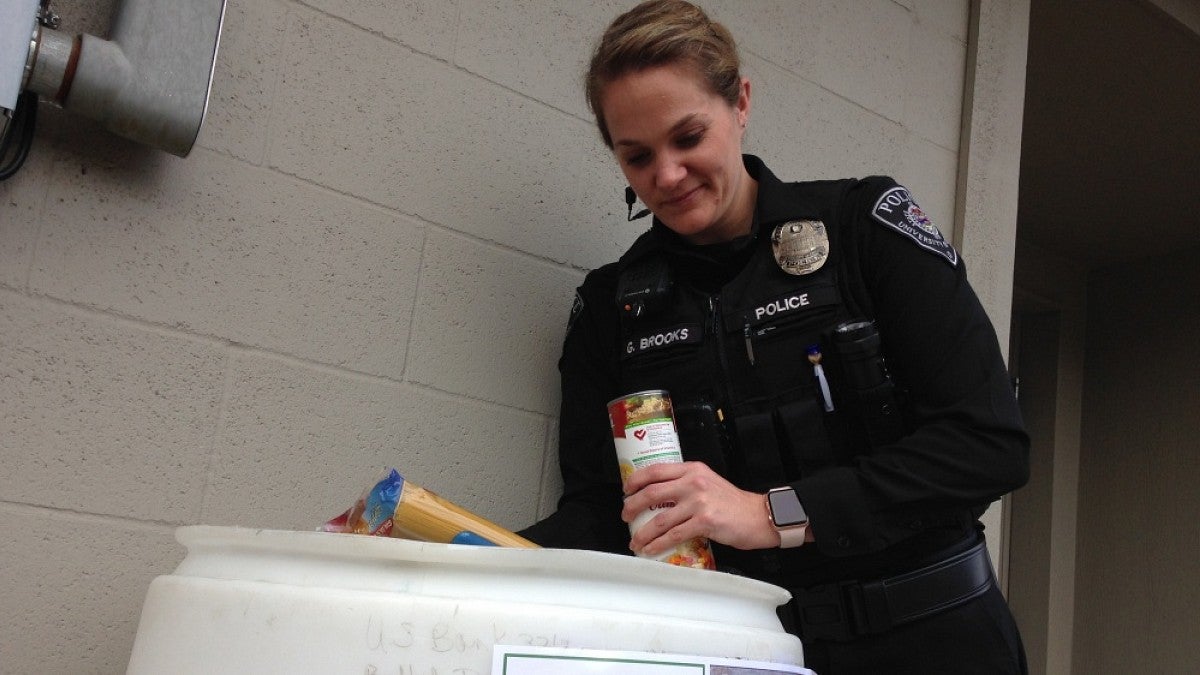The Food for Lane County website features “Hunger Stories,” personal accounts of community members who have experienced hunger and how the local food bank provides a lifeline to those in need.
But you don’t have to look off campus to find people who have been helped by a food bank.
UO police Officer Geri Brooks is coordinating her department's effort in this month’s Governor’s State Employees Food Drive. It was a role that went from being "voluntold" to a mission driven by her personal history.
As a child growing up in east Springfield, Brooks' family experience years when they counted on local food boxes to fill out meals. Later, as an adult with three small children at home, Brooks and her husband at times relied on food and grocery support from her church and family members. She said her husband worked a lot, but sometimes the family didn't have enough for housing and all the food they needed.
"As a child, I definitely remember using food boxes from Food For Lane County," she said. "I've also been an adult and wondered when I could buy my kids their next meal. When I look back on it now, I was very fortunate. I feel fortunate that I'm now in a situation that I can get this out there for other people."
When Brooks was younger, boxes were mostly the typical dry and canned goods, but she's impressed with the fresh fruits and vegetables that the food bank can share now. Brooks would even like to get her fellow UO Police Department officers to help serve meals at the Food for Lane County Dining Room. She sees the service and community spirit of the food drive linked perfectly with her life in uniform.
"In policing we encounter people who may be involved in crime who are homeless and probably hungry, and we know there are families at the other end of that as well," she said. "It's important to remember that connection, that there are wives and children affected by this person and what happens on the street, even if the people at home are not in that lifestyle.
"We're here to serve everyone," she said. "Some of the people we contact, they may be breaking a law, but they're still people and they deserve a good meal."
Marty Hurst, an administrative support specialist in the College of Education, is another coordinator with a personal history with hunger.
A 10-year employee of the UO, Hurst serves as the food drive’s banker, collecting and tracking cash donations and money from Euphoria chocolate sales. Spurring her interest in supporting the food drive are her memories of a time when she sought help from a food bank for her family.
Hurst had just moved her family to Tucson, Arizona, and they struggled to get by.
“We were living in our car,” she said, “living in a business complex at night, using a spigot to wash.”
Despite their struggle, Hurst found hope in the food donated by people in her new community.
“Food banks are not meant for you to live on forever, but it’s a godsend when you need it,” she said. “I’ve met people on this campus that are struggling to make ends meet. The food bank is what keeps them going from day to day.”
While the days of feeding her family from a food box are past, Hurst sees this month as an opportunity for UO faculty and staff to do something about the enduring problem of hunger.
“This is a good way to pull everybody together,” she said. “It’s not a lot to ask: a can of soup, a can of tuna, $12 a month. It’s not a lot to ask but it makes a difference.”
The food drive runs through Feb. 28, and thanks to an anonymous donor, all donations during the month will be matched up to $50,000. See your department’s coordinator for more information, or visit the UO Food Drive Facebook page.
—By Larissa Ennis, University Advancement, and Kelly McIver, University Communications


